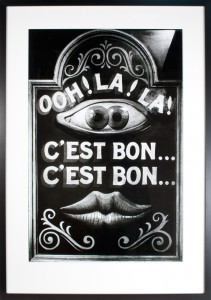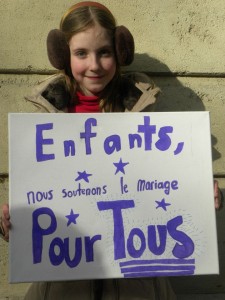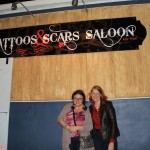We recently traveled to northeastern Italy for a week. It was the first time Ella, my nine-year-old daughter, had left France since August. What struck her the most? “Not being able to speak the language. It was disorienting.”
When Italians asked where she was from, she said, “France.” When she observed Italian cities, food, and clothes, her point of comparison was Paris. “Italian architecture is a lot older than in Paris,” she said, “because Paris is all Haussman,” the architect Napoleon III hired to transform narrow, winding streets into grand, open boulevards. She’s right: Italy makes France look young. Ferrara, for instance, is divided into Renaissance and Medieval neighborhoods, and the apartment we rented was in a subdivided 15th century palazzo.
What else was different? “People spoke a lot louder,” according to Ella. Not louder than in the U.S., but louder than in Paris. I have been reprimanded twice by Parisians at cafes for making too much noise. Anybody who has witnessed my feeble attempts at squeezing two words into a dinner party conversation knows how surprised I was to be shushed. I have the voice of a mouse. Americans are always saying, “What did you say?”
Bologna, where I had the best steak in my entire life, is the culinary capital of Italy, according to my guide book, and the food made a big impression on Ella. “The cuisine is a lot simpler in Italy,” she said. “You can almost always tell what a dish is made of, unlike in Paris,” where that green puree on your plate might get its color from frog legs or avocado. Ella was surprised that the bread was so bad. Even at the restaurant that served the platonic ideal of steak, the bread was not up to Parisian standards.
Nor were the clothes. “People dressed more casually,” she noticed. It’s not that they sported shorts and flip flops. But they lacked the crisp, tailored look we’ve become so accustomed to.
Except for a day trip to Venice, we stayed away from tourist centers, so language was an issue more than it ever was in Paris, even when we first arrived. When I bought bus tickets at a tabacchi in Ferrara, I had to muddle my way through Italian by speaking French but changing the accent to the penultimate syllable and pronouncing all the letters the French keep silent. I resorted to using my hands. And speaking very loudly. When at a total loss, it seemed like a good idea to just keep saying prego. The coat check attendant at the Este castle, hearing us speak English to each other, asked if we were from Germany. “No,” Ella said, “France.” That must have really confused her.
A wine seller, noticing Ella ogling the ceramic tags decorating his wine bottles (and observing, probably, that our bonjourno sounded like bonjour), starting speaking to Ella in French. “Un cadeau pour toi,” he said, handing her a flowered tag. “A gift for you.” The two of them chatted away en francais as my husband and I loaded up on Prosecco.
Apparently, I spoke French without knowing. When we arrived at the Venice Airport, I called our landlady in Ferrara to alert her. Our e-mail correspondence had been in English, so I thought I was speaking to her in my native tongue. But after I hung up my husband asked, “Why were you speaking French?”
“I wasn’t.”
“You said oui and non, Madame and a bientot.”
So maybe Ella was right. Maybe we’re from France. Now if I could just figure out when I’m being served frog leg broth and when I’m being given infusion of avocado, all will be bien. As long as I keep my voice down.




